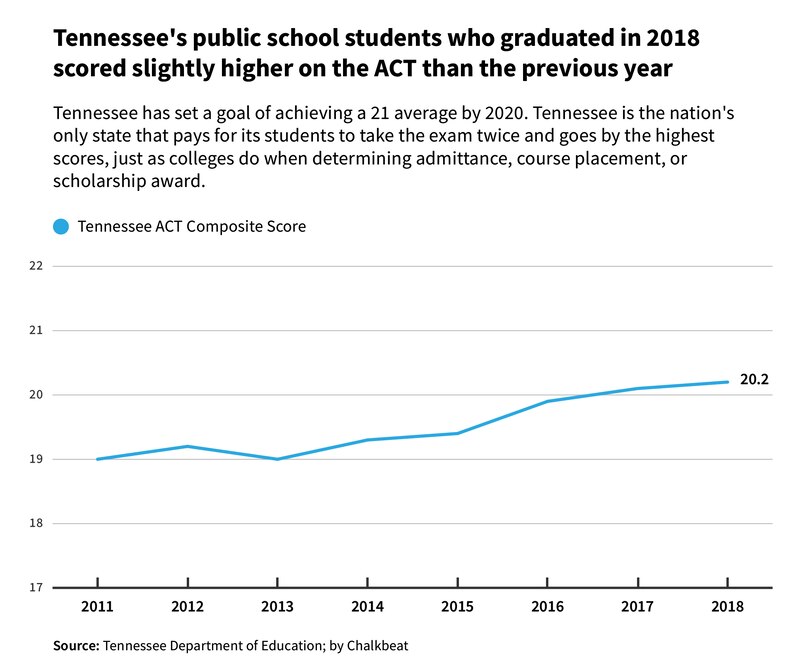Tennessee’s average ACT score ticked up slightly this year, again landing above 20 and defying national trends on the college entrance exam, according to results released on Wednesday.
On a scale of 1 to 36, the state’s public school students who graduated in 2018 scored an average of 20.2, up from 20.1 the previous year, as a record number of Tennesseans took the test.
While the change was statistically insignificant, the showing was still an encouragement for the state, which last year pushed its average over 20 for the first time ever. It also moves Tennessee closer to reaching its goal of achieving a 21 average by 2020.
This year’s national average of 20.8 was down from 21 in 2017, but included all of this year’s graduates, not just those in public schools as reported in Tennessee.
And while those national numbers showed troubling declines in most subjects — including a 20-year low in math — Tennessee students achieved nominal gains in math, English, and reading, while landing the same in science.
Education Commissioner Candice McQueen said the upticks were significant given that more than 2,000 additional Tennessee students took the exam, bringing the state’s participation rate to 97 percent for the Class of 2018.
“The ACT provides an opportunity for our students to show they are college and career ready, and seeing a higher average score at the same time more students are taking the test is a true testament to the work that is happening in Tennessee schools,” McQueen said in a statement.
She attributed the year’s scores to higher expectations under new academic standards aimed at deeper teaching and learning — one of the hallmarks of the state’s K-12 overhaul beginning in 2011.
Improving ACT performance has been a major objective for Tennessee, where college entrance scores mostly languished before launching a targeted strategy in 2015 to up its game and adding the national test as a measure of district accountability. Since 2011, the state’s average score has increased by more than a full point.

Tennessee is the only state that pays for its students to take the exam twice and — unlike the national report that is based on most recent test performance — Tennessee uses students’ best scores from multiple tries, just as colleges do when determining admittance, course placement, or scholarship awards.
The Class of 2018 was the second group to get a free do-over on the ACT, with more than 80 percent of students taking advantage of that opportunity in the fall of their senior year. Of those, nearly 40 percent increased their overall score.
“With increased ACT access and participation, our state has sent a strong signal to the country that Tennessee is committed to providing opportunities for our students’ futures,” McQueen said.
Public school students who earn composite scores of 21 or higher become eligible for state lottery-funded HOPE scholarships, which can be used to attend public or private colleges or universities in Tennessee. This year, 27,249 graduates exceeded that bar, 1,400-plus more than last year.
Tennessee also reported that students who are economically disadvantaged improved at a faster rate than any other student group, with 23 percent earning a score of 21 or higher, compared with 21.2 percent in 2017.
Among urban districts, students in Memphis (17.7) and Nashville (18.9) scored slightly lower than in 2017, while those in Knoxville (21.4) improved and the average score in Chattanooga (19.9) was unchanged.
For a third year in a row, Germantown Municipal District had the highest score in the state by posting a 25.9 average, up from 25.5 the previous year. Additionally, Moore County Schools showed the largest gains in Tennessee, raising its average by 1.7 points to 20.6.
Below is a searchable chart to look up your district’s average composite score.
Tennessee 2018 ACT scores by district
Chalkbeat graphic artist Sam Parks contributed to this story.
Correction: Oct. 31, 2018: A previous version of this story said more than 1,400 graduates scored 21 or higher to earn the HOPE scholarship. The correct number is 27,249, which is 1,400-plus more than last year.

